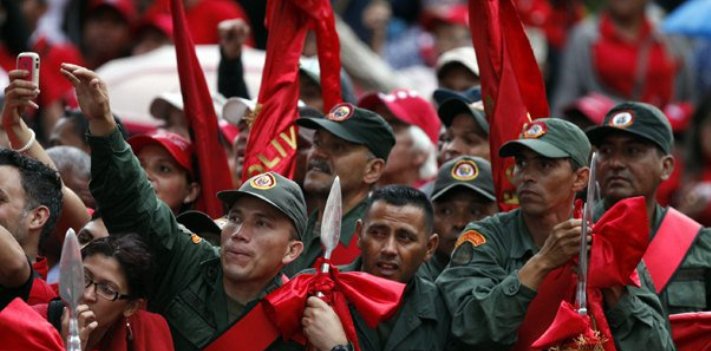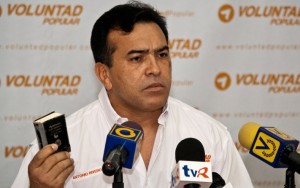
EspañolGrowing discontent in Venezuela over rampant shortages and insecurity has reached the National Armed Forces (FAN). According to Antonio Rivero, military leaders are having trouble maintaining allegiance not only to President Nicolás Maduro, but the obligatory “Chávez lives” salute.
Rivero, a retired army general who now lives in exile in the United States, tells the PanAm Post that the unrest within the military is most profound among low-ranking officers, whose families are suffering from the economic crisis in the country.
The former general is also a founding member of Popular Will, the Venezuelan opposition party led by Leopoldo López. He explains that a report produced by the Venezuelan Military Intelligence registered several acts of insubordination, especially among low-ranking officers. These soldiers either refused to respond or openly mocked Chavista salutes and slogans that glorify the late President Hugo Chávez.
The former general says the document is highly significant, since it gathers information from all FAN units and carries the signature of the director of Intelligence and Counterintelligence of the Venezuelan Army, Brigadier General José Miguel Jaimes Vivas.
https://twitter.com/antonioriverog/status/658437960501719041/photo/1
“If the military are protesting, it means they are working toward freedom and will uphold their duty.”
The document states that military officers are filled with uncertainty: “These professionals do not respond to the established salute, and those who do, respond with phrases such as ‘tell me where Chávez lives.’ Occurrences like these have spread uncertainty and undermined morale in a way that has discouraged our professional military personnel.”
According to Rivero, these openly rebellious expressions have become widespread within the army, which he says means that the FAN is waking up to years of intimidation and manipulation.
Ruling Party Commands the Army
The loudest criticism comes from lieutenants, first lieutenants, and captains, the retired general explains, and is directly linked to the worsening quality of life in Venezuela. Low-ranking army officers cannot afford to eat three meals a day, and have been victims of crime inside military zones, he says.

Rivero notes that pressures from the FAN itself over rampant crime in the country are what led to the Venezuelan government rolling out a massive police effort, known as the Operation for the People’s Liberation and Protection, in places like Fuerte Tiuna and other neighborhoods originally intended for military personnel.
The problems began when the Hugo Chávez administration started building large housing units for the Misión Vivienda (Housing Mission) program in these neighborhoods. As a result, army officers these days live next door to low-income families who at times resort to delinquency, crime, and drug trafficking.
The opposition leader says that the presence of Cuban military officers in strategic FAN posts is another source of discontent among troops, since the Cubans often receive more privileges than Venezuelan officers.
“They are also annoyed that politicians and Cuban advisers take over military facilities, especially within the Círculo Militar (Military Circle), which serves as a club as well as a vacation center,” he explains.
General Rivero claims that the ruling United Socialist Party of Venezuela (PSUV) employs army personnel during “political campaign events,” and that the party plans to put the army and national police to work for Chavismo on election day this coming December.
“They will tell members of the Bolivarian National Guard to dress up as civilians and campaign for the ruling party.”
[adrotate group=”8″]
Sanctioning Dissent
Rivero says the government is cracking down on military officers who rebel against its authority, with punishments ranging from military discharge to criminal prosecution and prison time.
The human-rights NGO Venezuelan Penal Forum maintains a record of all political prisoners in Venezuela. The organization claims that 16 FAN officers are currently locked up in the country for political reasons.
 Versión Español
Versión Español












